‘Make sure he fries.’ Unsolved for years, a Charlotte murder case turns cold in court.
Justin Ervin was 20 years old and madly in love.
He and his girlfriend Shasta Rich had just finished up a Saturday night of laughing and celebrating at Hooters for her little brother Christopher’s 15th birthday.
It was late by the time they said goodbye to her family and hopped in her silver still-new Ford Mustang to drive home.
Just before 1 a.m., Dec. 10, 2005, Ervin stopped at Sam’s Mart gas station in northwest Charlotte to buy a pack of cigarettes. He ran in while 17-year-old Rich waited in the car.
Outside, she saw a friend and said hello. When she saw his eyes go wide, she whipped her head around, she’d later tell her family.
Something was wrong.
Devalos Perkins' Purgatory
This 4-part news series by The Charlotte Observer examines how a cold case murder devolved into a man’s decade-long purgatory in jail, mental health hospitals and court. This chapter of the series focuses on the night of the murder in 2005 and the journey of the victims’ loved ones toward justice. In Chapter 1, we told the story of Perkins spiraling in solitary confinement and his doomed years awaiting trial. With no end in sight, prosecutors have yet to prove his guilt. Our investigation digs into how one provision of North Carolina law threatens to keep him in purgatory forever.
Chapter 1: Purgatory behind bars: He’s spent 11 years in jail — and no one knows if he’s guilty
Chapter 2 - You are here
Chapter 4: Imprisoned — with no conviction? How one word in NC law traps mentally-ill defendants.
Girlfriend attacked
Three men ran to the car. Rich tried, frantically, to roll up the window. She wasn’t fast enough.
“You are going to do exactly what I say,” one of them told her, pointing a pistol at her through the window opening.
From inside, the gas station clerk saw what was happening and told Ervin, who ran out toward his girlfriend.
“What are y’all doing,” he yelled. “Get away from her!”
He didn’t know they had a gun.
The three men attempted to drag her out of the front seat. She told a Charlotte Observer reporter at the time that the men were trying to pull down her pants and underwear.
Ervin began to fight.
Rich leaped out of the car and escaped as the first shot rang out.
She recalled later that she was running away when one of the men yelled: “Shoot the bitch she’s going to the police!”
Ervin was on the ground, already wounded.
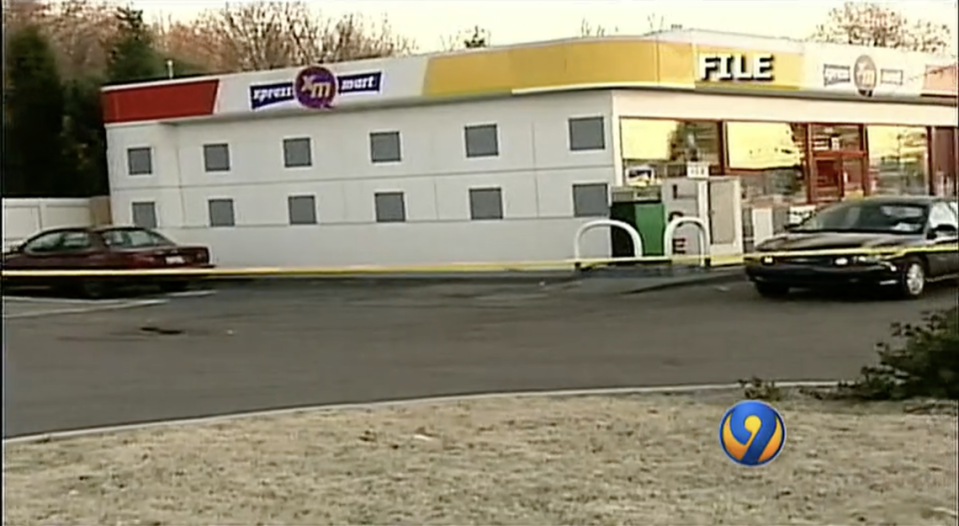
Rich would tell police and her family she looked back, toward her boyfriend and the car. Although she would never get a chance to testify in court, what happened next, her brother says, tortured her for years.
The man holding the gun made eye contact with her, then looked at Ervin and shot at him a second time.
The suspects drove off in her car, according to a Charlotte-Mecklenburg Police report. Rich ran inside the store and pleaded with a cashier to call 911, her brother and grandmother recently told the Observer.
She told her family the cashier refused to call police, out of fear of retaliation. So Rich climbed over the counter and called them herself.
On the pavement outside the store, Rich told her brother, someone had rolled Ervin’s body over and stolen the pack of cigarettes.
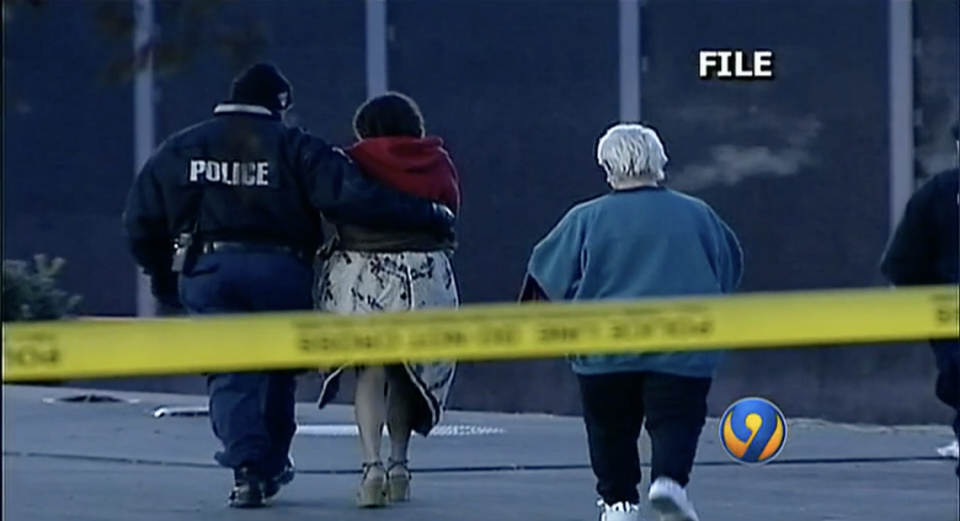
Murder, turned cold case
Rich — tearful and panicked — called Carol Linker, Ervin’s aunt.
Ervin was barely alive when paramedics and police arrived. He’d been shot in the abdomen during the robbery and died soon after at the hospital, public records show.
Linker broke the news to Ervin’s mother, Dawn Dusharm, hours later.
Both women, in a recent interview with the Observer, remember the shock.
Dusharm spoke with detectives and said for the first few days, they were still trying to piece together what happened.
All three suspects, police believe, got away in the car they’d just stolen and crashed it only three houses down. Then they were gone, according to a 2005 Observer article.
A Charlotte-Mecklenburg Police captain called the attack random and said random killings were rare in Charlotte at the time.
“Justin was just trying to get them off of me,” Rich told reporters. “He didn’t have to shoot him ... They had already pistol whipped him. He wasn’t trying to fight back.”
Dusharm recalls grainy security footage of the attack, and daily phone calls where she pleaded with detectives to find her son’s killers.
Rich gave a description of the men she saw that night. CMPD later said all three suspects were described as Black men.
One suspect, according to details from police at the time, was about six feet tall and slim with “buck teeth,” and wore a black jacket, a red shirt, and a red bandana under a black knit hat.
Another was described as muscular in his late teens, around 5’8,” wearing a black T-shirt, and blue jeans.
The third was also in his teens and 5’8,” with a “large nose,” wearing a shiny black jacket, royal blue shirt, blue jeans, blue bandana, and white Nike tennis shoes.
Then, the waiting started.
Dusharm called Detective Bill Ward, in charge of the homicide case for CMPD, nearly every day for three years, she says.
The calls slowed as hope dwindled and the department still hadn’t made any arrests.
Every time a lull hit the case, Detective Ward encouraged Dusharm to make a plea to the public. TV interviews became a familiar hoop she had to jump through on her never ending search for the three men who killed her son.
Dusharm spiraled after his death. She lost her job and was homeless for five years.
“I got on drugs then cause I could not close my eyes at night the pain was so bad,” Dusharm said. “I didn’t care any more cause my life was my kids and he was gone. It was unbearable. I wish it on no one.”
Police did their best with the security camera footage and few witnesses, she said.
But it wasn’t until late 2011 — six years later — that an arrest was finally made.
Arrests in Justin Ervin murder
Dusharm was driving to her niece’s dance recital when the call came.
Detective Ward told Ervin’s mother police were about to make an arrest.
“Arrest made in ‘05 slaying,” the Sunday edition of the Charlotte Observer read on Dec. 4, 2011.
Tyrice Lavar Boyd, already a convicted felon at the time, was charged with first-degree murder.
A second man — whose name is now all but scrubbed or missing from documents connected to the murder — would be implicated later.
Within a year, police arrested their third and final suspect: Devalos Perkins.
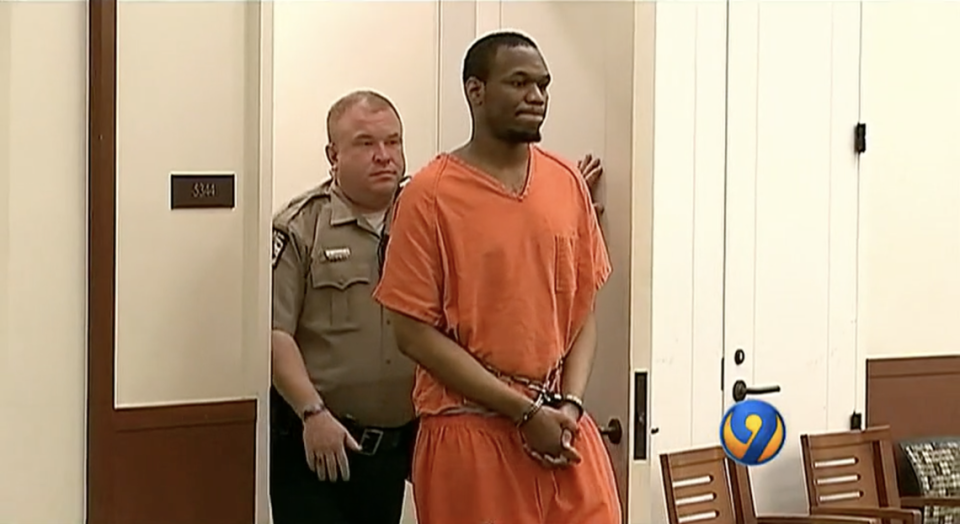
Perkins — almost 20 years after the crime — is the only one of three suspects still incriminated.
With Perkins and Boyd in custody, the Mecklenburg County District Attorney’s office dropped the charges against Boyd in 2012. He left jail two months after Perkins arrived. Prosecutors cited lack of evidence in court documents regarding the dismissal.
“No further information may be provided at this time, as cases against the co-defendant are pending,” the dismissal sheet reads.
It remains unclear whether authorities ever charged a third suspect. Another man, a possible relative of Boyd, is named on Perkins’ indictment sheet as a co-conspirator to the crime of armed robbery. If he was charged, the original charges are gone, possibly expunged from his criminal record and no file exists at the courthouse.
Neither of the alleged co-conspirators returned the Observer’s requests for comment.
CMPD refused to allow the Observer to interview the sole remaining detective who worked on this case, saying they wouldn’t comment while the court case was still pending.
The man behind the memory
Ervin grew up in Charlotte and attended West Mecklenburg High School.
He and Rich lived together and had been dating for about 2 1/2 years. They were planning to get married, she said at the time.
Christopher Rich, 32, Shasta Rich’s little brother, thought of Ervin as an older brother. He said he was kind to him, treated him like a friend, and always kept their family laughing.
He speaks of Ervin with a reverence most reserve for a hero. It meant the world to him, he said, that Ervin would wake up early and play video games with Rich for hours, making him laugh and feel included.
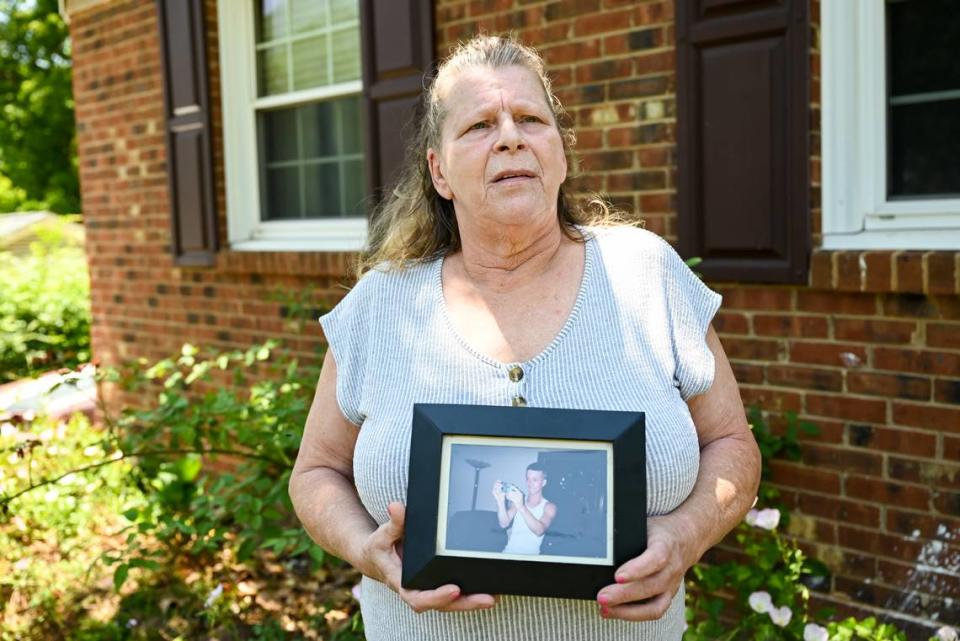
Ervin had a tumultuous childhood. His father, Dusharm says, “wasn’t really in the picture.”
His mother lost custody when he was 12 years old. Still today, she says she misses him every day and maintained a relationship with him into his adulthood.
He was eventually adopted, according to Rich’s family, and then kicked out of his adoptive home as a teenager. He slept in cars until Rich’s family took him in, Rich’s brother and grandmother told the Observer.
Rich met Ervin through one of her old friends while Ervin was living in his car.
Dusharm remembers her son as a young child who loved animals. It’s one of the first things she told the Observer in an interview in May.
“One time,” Dusharm laughed, ”a possum got run over in the road. He brung it in and put it in the bathtub and tried to save it.”
He was eight or nine at the time, she said, and he was determined to save that possum.
“He loved animals, he loved everybody, he’s sweet…he was very sweet.”
Ervin was a protector, and that instinct didn’t stop at pets.
Despite losing her son, Dusharm is proud of him for protecting his girlfriend.
“I feel like I raised him right,” she said. “I’m proud of him for trying to stand up for her and trying to do the right thing. And that just tells me he would have been fine during life.”
One of the things that hits Dusharm the hardest when she thinks about Ervin is the absence.
The empty seat at family get togethers, the lack of his laughter mingled with everyone else’s, and the fact that while her friends are busy with grandchildren, she isn’t.
The pain hasn’t changed or faded since she first got the call that Ervin was dead, she said. But she has learned to live with it.
Ervin’s obituary names his adoptive family, and Dusharm and Linker took out space in the newspaper seven months after his death to mark his 21st birthday.
“It has been just seven months since you left us but our memories of you are as the gentle rain,” the piece reads. “The beautiful smile, the laugh that lit up your hazel eyes, and the blond hair that we always cut short because of your cowlick. Your loving spirit that always helped you overcome the roadblocks in your life. Your family misses you so much.”
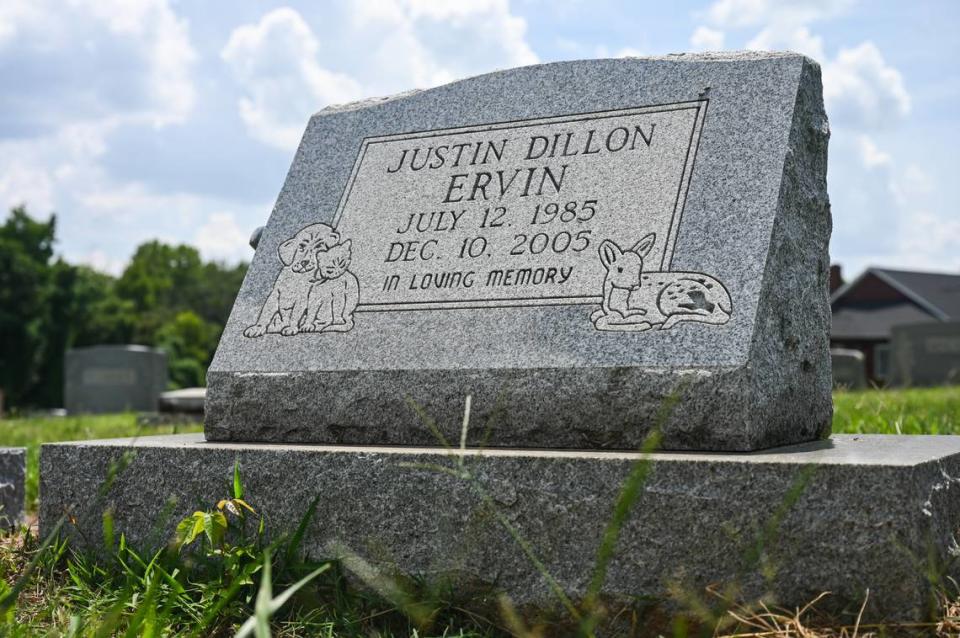
It took seven months for Dusharm to work on a memorial piece for Ervin because after his death and at his funeral she was falling apart.
Nearly 20 years later Dusharm still cries when she talks about his funeral because it was the first time she saw her own father breakdown and cry. “To see my dad, sit up there at his funeral and cry, that broke my heart,” she says.
She described the funeral as simple and sweet, attended by friends of the young couple.
“That was just the kind of effect Justin had on people, everybody loved him,” Dusharm said. “It was probably the hardest thing just to see the sadness.”
Ervin’s tombstone sits next to his aunt and uncle’s in the Trinity United Methodist Church’s cemetery off Beatties Ford Road. It is engraved with a kitten cuddling a puppy, a baby deer that could be mistaken for Disney’s Bambi, his name, and the day he died.
“In loving memory” is chiseled near the base of the headstone.
The never-ending day in court
Dusharm has sat on the hard benches in the Mecklenburg County courthouse more times than she can count over the last decade.
Each time she was accompanied by her family and carried a letter — officially called a victim impact statement — that would explain her pain to a judge and jury.
“Today is going to be the day,” she’d think.
Now she comes to the courthouse on East 4th Street a lot less often, and the court doesn’t schedule the would-be hearings and trials as often as they used to.
Linker is usually the only person with her.
The others who would have given impact statements — Ervin’s uncle, grandparents, and girlfriend — have all died.
Even Bill Ward, the detective she relied on in Ervin’s case, has since retired.
Dusharm said it feels like the waiting will never be over.
“I’ve got a lot of depression. It’s hard to move forward,” she said.
Meanwhile, Perkins has cycled in and out of jail and mental health hospitals. For more than 10 years, he has been incarcerated without having ever gone to trial.
Dusharm said prosecutors told her they have enough evidence to convict him, and said the description Rich gave to police that night perfectly matched him.
“Even his teeth,” she said.
For the majority of the time the case has lingered, the main witness to the murder — Shasta Rich — lived in the Charlotte area. Her family said she refused to leave the house or to open the blinds on the windows for over a year out of fear.
Her statement could have been key to the end to Perkins’ purgatory had a trial been held. Yet her brother says she had never planned to show up to testify in court and police told her she didn’t have to.
She died of an overdose in March 2022 leaving behind her 6-year-old son, brother, and grandmother.
“She never was right after Justin died so she turned to drugs,” Christopher Rich said.
Over a decade after the murder, Rich got engaged and had her son and was hoping to become a mental health peer support specialist, according to her social media posts and family.
“I know I can be the best, because I have done it all, seen it all and will be able to truly understand what they are going through,” her family, in her obituary, quoted her as saying.
“She was funny and always trying to help fix others when she couldn’t fix herself,” her obituary says. “You knew the good, the bad, and her family knew her demons.”
Christopher Rich believes the delays in the murder case shouldn’t have taken this long.
“They should have sentenced them and have been punished already,” he told the Observer.
In a 2018 interview with Channel 9, Dusharm said she would accept the court releasing Perkins from jail “tomorrow” as long as he admitted he was the one who killed her son.
Now, her thoughts have changed.
“I want him to stay in there. I want him to do as many years as he can do,” she told the Observer.
“If they can’t get him competent enough to go into a courtroom and answer to his charges, what’s it going to be like when he gets out?
“I’m gonna make sure he fries for what he done.”
But prosecutors took the death penalty off the table years ago. A judge, right after his arrest, refused bond, deciding Perkins must remain in jail until trial.
At least twice, the case has inched forward, giving Dusharm hope of some kind of closure. She went to court a couple of times expecting to see Perkins after being told he’d agreed to plead guilty in exchange for a lesser sentence.
But each time he was near the end of jail purgatory, the plea deals fell apart as Perkins shared out loud the hell that had taken over his mind.
Sources
Scenes not witnessed by the reporter in this series were compiled from research, interviews and public records including documents from the Mecklenburg County Detention Center and Clerk of Superior Court.
Credits
Kallie Cox | Reporter
Anna Douglas | Editor
Rachel Handley | Illustrations & Design
Gabby McCall | Page Design
David Newcomb | Development & Design

